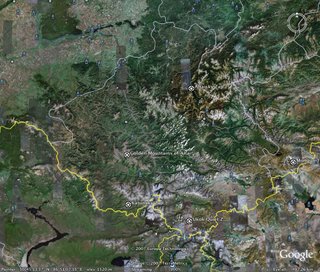Keith Howard from SOAS suggested I contact Carole Pegg, an ethnomusicologist specialising in Mongolian music, for enlightenment. I'm very glad I did. Carole put me on to an English translation of the Maadai-kara written in 1986. Here is a quote from page 17 of Maday Qara as it was spelt by Ugo Marazzi*, the author of the translation.
The recording of Maday Qara on which this edition is based was made by S.S.Surazakov in February-March 1964 at the Institute of Language and Literature in Gorno-Altajsk before many listeners. The performance lasted eight hours.... It took Surazov 20 days to put into writing the text recorded on the magnetophone. During the long and delicate operation Kalkin** himself was constantly present. The final poem was composed of 7738 verses.
As far as I am aware, that was the last time the whole Maadai-kara was recorded. I was able to find a copy of Ugo's book in the British Library and so I'm in the process of reading it and Carole Peggs book, Mongolian Music, Dance and Oral Narrative, University of Washington Press, 2001.Although the Maadai-kara follows an essentially ancient Turkic form, it contains many Mongolian loan-words and motifs. Perhaps this is not surprising as the region that is now the Altai Republic was once part of both Mongolian empires.
* Maday Qara, An Altay Epic Poem, translated by Ugo Marazzi, Instituto Universitario Orientale, Series Minor XXV, Naples 1986.
** Alexsei Grigorevic Kalkin was born in 1925 in a village of the Ajmak of Ulagan. His father was a kai singer. Alexsei suffered disease that damaged his sight. While under treatment in Gorno-Altaisk he met the greatest kai singer of the day, N.U. Ulagsev who exerted a decisive influence on him. Alexsei went on to become a great performer in his
turn and taught the current generation of kai-singers.
Note: kai is the Altaian name for throat or over-tone singing

